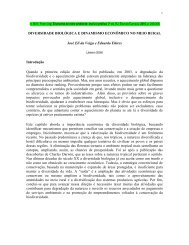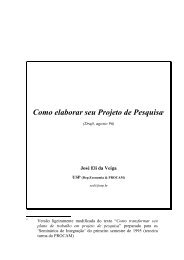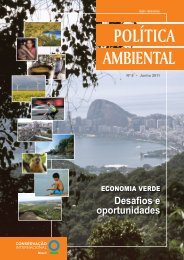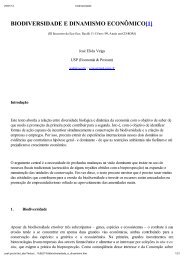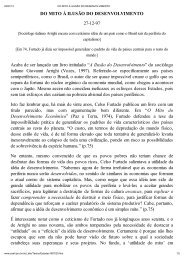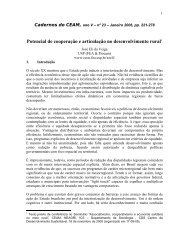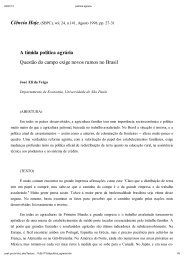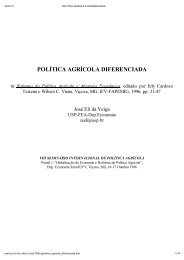sustainable development 20 years on from the ... - José Eli da Veiga
sustainable development 20 years on from the ... - José Eli da Veiga
sustainable development 20 years on from the ... - José Eli da Veiga
You also want an ePaper? Increase the reach of your titles
YUMPU automatically turns print PDFs into web optimized ePapers that Google loves.
232<br />
(iv) C<strong>on</strong>ceptual shortcomings and technical, scientific, technological and productive c<strong>on</strong>straints<br />
in <strong>the</strong> regi<strong>on</strong> are hindering progress towards a model of productive <str<strong>on</strong>g>development</str<strong>on</strong>g> that is more<br />
inclusive, cleaner and less dependent <strong>on</strong> natural resources, as well as hindering <strong>the</strong> use,<br />
design and implementati<strong>on</strong> of suitable soluti<strong>on</strong>s.<br />
(v) The failure to fully meet internati<strong>on</strong>al cooperati<strong>on</strong> commitments —<strong>on</strong> market access and<br />
financial and technological matters— plays a critical part in perpetuating <strong>the</strong> persistent gaps<br />
in implementing <str<strong>on</strong>g>sustainable</str<strong>on</strong>g> <str<strong>on</strong>g>development</str<strong>on</strong>g> commitments, especially in <strong>the</strong> smallest, least<br />
developed and heavily indebted States.<br />
Experiences in <strong>the</strong> regi<strong>on</strong> in <strong>the</strong> past <str<strong>on</strong>g>20</str<strong>on</strong>g> <str<strong>on</strong>g>years</str<strong>on</strong>g> have highlighted <strong>the</strong> importance of streng<strong>the</strong>ning<br />
<strong>the</strong> State and establishing str<strong>on</strong>g, coordinated public policies in order to make progress with <str<strong>on</strong>g>development</str<strong>on</strong>g>,<br />
eradicate poverty and overcome <strong>the</strong> deep inequalities that characterize Latin America and <strong>the</strong> Caribbean<br />
(ECLAC, <str<strong>on</strong>g>20</str<strong>on</strong>g>10). The regi<strong>on</strong> urgently needs to tackle <strong>the</strong> dual, cross-cutting challenge of ensuring that<br />
<str<strong>on</strong>g>development</str<strong>on</strong>g> is envir<strong>on</strong>mentally <str<strong>on</strong>g>sustainable</str<strong>on</strong>g> and building physical and ec<strong>on</strong>omic resilience to <strong>the</strong> effects<br />
of envir<strong>on</strong>mental degra<strong>da</strong>ti<strong>on</strong>, especially climate change in additi<strong>on</strong> to macroec<strong>on</strong>omic challenges and<br />
o<strong>the</strong>rs relating to social protecti<strong>on</strong>, educati<strong>on</strong>, access to basic services, labour policies, productive<br />
<str<strong>on</strong>g>development</str<strong>on</strong>g> and territorial <str<strong>on</strong>g>development</str<strong>on</strong>g> policies. The preceding analyses shows that investment in<br />
improving envir<strong>on</strong>mental legislati<strong>on</strong> and instituti<strong>on</strong>ality is not enough and, as in o<strong>the</strong>r regi<strong>on</strong>s of <strong>the</strong><br />
world, <strong>the</strong> greatest challenge lies in ensuring that <strong>the</strong> instituti<strong>on</strong>s devoted to <strong>the</strong> three pillars of<br />
<str<strong>on</strong>g>development</str<strong>on</strong>g> work in a comprehensive, coherent manner towards sustainability.<br />
In urban areas, improving quality of life entails comprehensively tackling housing, employment and<br />
income needs, basic services and infrastructure, public spaces and secure tenure issues. In <strong>the</strong> past two<br />
decades <strong>the</strong> regi<strong>on</strong> has adopted a housing approach involving policies and programmes focused purely <strong>on</strong><br />
<strong>the</strong> provisi<strong>on</strong> of housing without c<strong>on</strong>sidering <strong>the</strong> o<strong>the</strong>r, broader comp<strong>on</strong>ents of urban <str<strong>on</strong>g>development</str<strong>on</strong>g>.<br />
Secti<strong>on</strong> B presents seven cross-cutting guidelines intended to help governments in <strong>the</strong> regi<strong>on</strong> (and<br />
in some cases subnati<strong>on</strong>al governments) make progress in integrating <strong>the</strong> three pillars of <str<strong>on</strong>g>sustainable</str<strong>on</strong>g><br />
<str<strong>on</strong>g>development</str<strong>on</strong>g>: envir<strong>on</strong>mental, social and ec<strong>on</strong>omic. Secti<strong>on</strong> C focuses <strong>on</strong> small island developing States.<br />
Secti<strong>on</strong> D covers <strong>the</strong> internati<strong>on</strong>al c<strong>on</strong>diti<strong>on</strong>s for narrowing gaps in <strong>the</strong> implementati<strong>on</strong> of <str<strong>on</strong>g>sustainable</str<strong>on</strong>g><br />
<str<strong>on</strong>g>development</str<strong>on</strong>g> commitments, while secti<strong>on</strong> E presents <strong>the</strong> closing remarks.<br />
The guidelines are closely related to <strong>the</strong> two <strong>the</strong>mes for <strong>the</strong> United Nati<strong>on</strong>s C<strong>on</strong>ference <strong>on</strong><br />
Sustainable Development (Rio+<str<strong>on</strong>g>20</str<strong>on</strong>g>), which were established in resoluti<strong>on</strong> 64/236 adopted by <strong>the</strong> United<br />
Nati<strong>on</strong>s General Assembly: (i) a green ec<strong>on</strong>omy in <strong>the</strong> c<strong>on</strong>text of <str<strong>on</strong>g>sustainable</str<strong>on</strong>g> <str<strong>on</strong>g>development</str<strong>on</strong>g> and poverty<br />
eradicati<strong>on</strong>; and (ii) <strong>the</strong> instituti<strong>on</strong>al framework for <str<strong>on</strong>g>sustainable</str<strong>on</strong>g> <str<strong>on</strong>g>development</str<strong>on</strong>g>. Guidelines 4 and 6 refer<br />
mainly to <strong>the</strong> instituti<strong>on</strong>al framework for <str<strong>on</strong>g>sustainable</str<strong>on</strong>g> <str<strong>on</strong>g>development</str<strong>on</strong>g>, whereas guidelines 1, 2, 3 and<br />
7 c<strong>on</strong>cern <strong>the</strong> green ec<strong>on</strong>omy. It is acknowledged, however, that <strong>the</strong> countries in <strong>the</strong> regi<strong>on</strong> have not yet<br />
reached agreement <strong>on</strong> <strong>the</strong> meaning of <strong>the</strong> term “green ec<strong>on</strong>omy”. As a result, <strong>the</strong> c<strong>on</strong>cept will take <strong>on</strong><br />
different c<strong>on</strong>notati<strong>on</strong>s in line with <strong>the</strong> priorities and particular characteristics of each regi<strong>on</strong> and country<br />
and cannot be seen in isolati<strong>on</strong> <strong>from</strong> <strong>the</strong> objectives of <str<strong>on</strong>g>sustainable</str<strong>on</strong>g> <str<strong>on</strong>g>development</str<strong>on</strong>g> and poverty eradicati<strong>on</strong>.<br />
Guideline 5 is related to both <strong>the</strong>se objectives.



